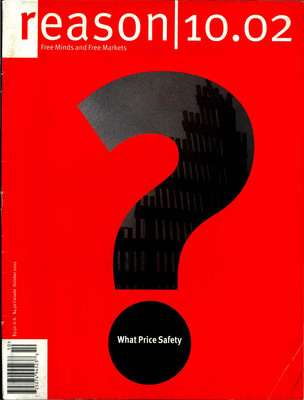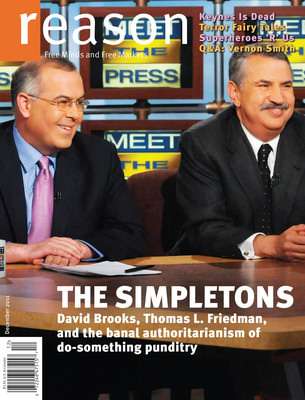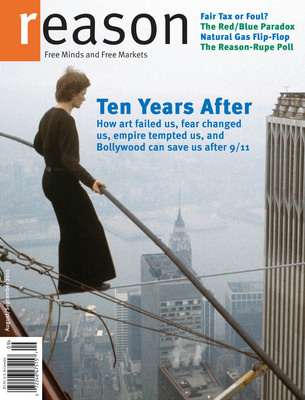My 9/11 Anniversary Slogan: 'We Don't Know'
Our policy responses in the aftermath of that vile day should teach us all to be more humble

One of the worst national reactions to the appalling mass murder 14 years ago this morning was an outbreak of premature certainty masquerading as tough-minded moral clarity. We tend to remember some of the presidential lowlights—George W. Bush saying "Either you are with us, or you are with the terrorists" just one week after smoking cigars with Saudi Prince Bandar on the White House balcony—but it was really all over the national discourse, including from me, and from people you agreed with, then or now.
Peaceniks were wrong to be certain that the U.S. military fight in Afghanistan would get bogged down in the harsh Afghan winter before successfully toppling the Taliban-led regime. Hawks were wrong to do an endzone dance on the peaceniks' heads without thinking through the endless drip of military occupation. It wasn't just the facts that people were wrongly certain about, it was the way they were so sure of themselves. Here's the type of argumentation I mean, in a June 2002 piece that came across my desk earlier this week, written by Larry Kudlow at National Review. Sample:
With weapons of mass destruction at his disposal, and through his financing of terrorism worldwide, Saddam is a dangerous loose end.
Decisive shock therapy to revive the American spirit would surely come with a U.S. invasion of Iraq. Why not begin with a large-scale special-forces commando raid on the Iraqi oil fields? This will send a shot across Saddam's bow; an electrifying signal to all terrorist nations. The message will be that the game is up. Surrender now or you will be crushed in a short while. […]
A couple of weeks later a final assault on Baghdad can take place. A small war, to use Wall Street Journal editorialist Max Boot's lexicon, led by fast-moving special forces and leather-toughened Marines, and assisted by high-tech precision bombs and air cover, can get the job done. All-out war mobilization is unnecessary. Iraq will fall with much less. […]
[S]tatements of principle only go so far. The spirit and security of the United States now require the instrument of war.
The shock therapy of decisive war will elevate the stock market by a couple-thousand points. We will know that our businesses will stay open, that our families will be safe, and that our future will be unlimited. The world will be righted in this life-and-death struggle to preserve our values and our civilization. But to do all this, we must act.
Turns out that Saddam did not have those WMDs at his disposal, the American spirit was not decisively revived via the shock therapy of war, the gig was not up for terrorist-supporting nations (especially Iran, who was supporting much more terrorism at the time than Iraq, and which was strengthened, not weakened, by the toppling of Saddam Hussein). A small war did not end up getting the job done; in fact, the all-out war mobilization Kudlow had insisted was unnecessary was still insufficient to secure a post-war peace. The world was not "righted" by the Iraq War, and we do not (I don't think) "know" that "our future will be unlimited." About the only certainty Kudlow got right here (appropriately enough, given his day job) was that the stock market did indeed rally by a couple thousand points.

I don't mean to single out the genial CNBC host, or even supporters of the Iraq War. It's the false omniscience, the habit of mind that reacts to an unfathomable event by blotting out all complexity and doubt, and replacing it with utterly confident assertions about the stubbornly unknowable and unplannable future. This is another Iraq example, from David Brooks in March 2003, but it best illustrates the mindset I'm talking about:
any poor rube can come to a simple conclusion—that President Saddam Hussein is a menace who must be disarmed—but the refined ratiocinators want to be seen luxuriating amid the difficulties, donning the jewels of nuance, even to the point of self-paralysis. But those who actually have to lead and protect, and actually have to build one step on another, have to bring some questions to a close.
Questions, alas, do not so handily close. And as the rise of Donald Trump reminds us, there is, contra Brooks, very little reward out there in the field of political and policy commentary for luxuriating in difficulties and nuance. Certainty makes for much better television than doubt. People would rather confuse Kurds with Quds than admit they're only noddingly familiar with either.
We see this mental habit of surety in the way we talk about issues today, particularly those that involve life and death, from the "war on cops" to the national security state to the Syrian refugee crisis to the nuclear deal with Iran.
We don't know whether the Iran deal will make war more or less likely in the war-torn Middle East, yet President Barack Obama says rejecting it is a vote for war, and a bunch of ex-military officials think the deal will make war the likeliest outcome. We don't know whether the military intervention hawks wanted in Syria would have stemmed the refugee crisis or even created a more stable Middle East (for those who think they know the answer to that question, recall that pro-interventionists in Libya were taunting the anti-interventionists as recently as August 2011). For us skeptics of war, we don't know whether the strategic U.S. pullback we advocate would increase or decrease the likelihood of near-term or medium-term misery, subjugation, and genocide. We may all have our strong beliefs, but we too often dress them up as unassailable facts.

What would happen in a world where humans, including those in or near power, freely admitted that they don't know how to stop ISIS, can't tell the difference between a Yazidi and and Assyrian, have no convincing explanation for why crime stats are fluctuating this year, and don't know why Billy Beane's shit doesn't work in the playoffs? For one, I think people would be a little less likely to champion or sign up for giant, mass-mobilizing schemes. If we are humble in the face of facts, and mindful of the unforeseen consequences that come with every grand plan, we might be more cautious about bending a sprawling nation's resources and will in one direction or another. Hence the pro-interventionist anxiety: We don't know will too easily translate into We won't act.
But the real benefits to humility are more individual than societal. One of the things that the experts knew after 9/11 is that there would be an immediate American backlash against Muslims and people of Middle Eastern descent. Well, the experts were wrong. We didn't know about the Muslim world's beef with the United States, or the backstory behind the odd lines drawn on Middle Eastern maps, so we read up on it. Not for the last time, panic over Middle America's inherent violence turned out to be unfounded.
My great regret after 9/11, both as an individual and as a citizen of a country that has been so poorly governed ever since, is that that thirst for knowledge and innate sense of decency was not also tempered with an appreciation for the limits of both human understanding and bureaucratic competence. With half of Republican voters currently supporting Great Man-theory novices, and virtually all Democrats lining up behind candidates with unshakeable confidence in the liberating power of government, it doesn't appear that we will learn that lesson any time soon.


Show Comments (421)